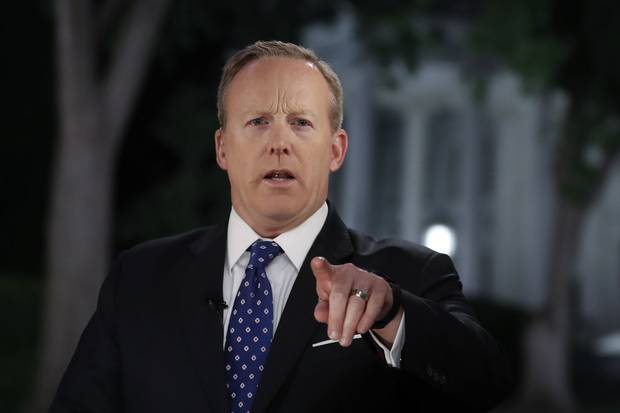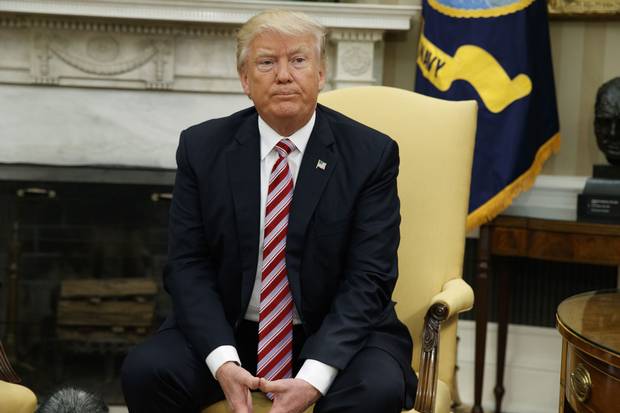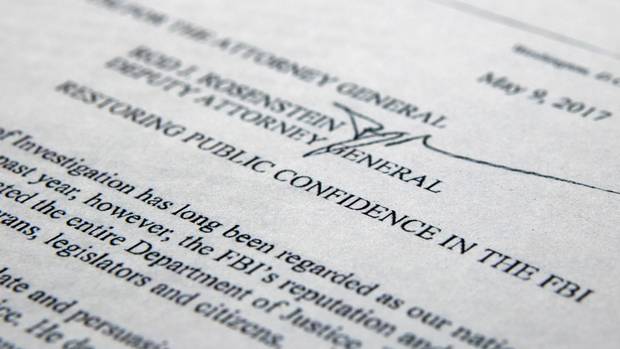1. The Spicer statement

CAROLYN KASTER/ASSOCIATED PRESS
Background: On Tuesday, President Donald Trump abruptly fired FBI Director James Comey, dramatically ousting the nation's top law enforcement official in the midst of an FBI investigation into whether Mr. Trump's campaign had ties to Russia's meddling in the election that sent him to the White House. The announcement of the decision fell to Mr. Trump's press secretary, Sean Spicer.
What he said
Today, President Donald J. Trump informed FBI Director James Comey that he has been terminated and removed from office. President Trump acted based on the clear recommendations of both Deputy Attorney General Rod Rosenstein and Attorney General Jeff Sessions.
“The FBI is one of our Nation’s most cherished and respected institutions and today will mark a new beginning for our crown jewel of law enforcement,” said President Trump.
A search for a new permanent FBI Director will begin immediately.
2. The Trump letter

EVAN VUCCI/ASSOCIATED PRESS
Background: Tuesday's announcement included the release of Mr. Trump's letter to Mr. Comey announcing his dismissal. Mr. Comey has come under intense scrutiny in recent months for his public comments on an investigation into Democrat Hillary Clinton's e-mail practices, including a pair of letters he sent to Congress on the matter in the closing days of last year's campaign. Mr. Comey strongly defended his decisions during hearings last week on the Trump-Russia connections. Mr. Trump's letter made no mention of Mr. Comey's role in the Clinton investigation, which she has blamed in part for the election result.
What he said
Dear Director Comey:
I have received the attached letters from the Attorney General and Deputy Attorney General of the United States recommending your dismissal as the Director of the Federal Bureau of Investigation. I have accepted their recommendation and you are hereby terminated and removed from office, effective immediately.
While I greatly appreciate you informing me, on three separate occasions, that I am not under investigation, I nevertheless concur with the judgment of the Department of Justice that you are not able to effectively lead the Bureau.
It is essential that we find new leadership for the FBI that restores public trust in its vital law enforcement mission.
I wish you the best of luck in your future endeavors.
Donald Trump
3. The Sessions letter

JACQUELYN MARTIN/ASSOCIATED PRESS
Background: Attorney-General Jeff Sessions recused himself from any Trump-Russia investigation in March after the Justice Department acknowledged he had spoken twice with the Russian ambassador last year and had failed to disclose the contacts during his Senate confirmation process. Mr. Sessions said he had not tried to mislead anyone but could have been more careful in his answers, and he later filed amended testimony. The documents released Tuesday by the White House included a short letter from Mr. Sessions recommending that Mr. Comey be fired.
What he said
Dear Mr. President:
As Attorney General, I am committed to a high level of discipline, integrity, and the rule of law to the Department of Justice – an institution that I deeply respect. Based on my evaluation, and for the reasons expressed by the Deputy Attorney General in the attached memorandum, I have concluded that a fresh start is needed at the leadership of the FBI. It is essential that this Department of Justice clearly reaffirm its commitment to longstanding principles that ensure the integrity and fairness of federal investigations and prosecutions. The Director of the FBI must be someone who follows faithfully the rules and principles of the Department of Justice and who sets the right example for our law enforcement officials and others in the Department. Therefore, I must recommend that you remove Director James B. Comey, R. and identify an experienced and qualified individual to lead the great men and women of the FBI.
Sincerely,
Jeff Sessions
4. The Rosenstein letter

AARON P. BERNSTEIN/REUTERS
Background: Since Mr. Sessions's recusal from the Trump-Russia probe, Deputy Attorney-General Rod Rosenstein has been the man overseeing the Justice Department investigation. The sharply worded memo about Mr. Comey could add to concern among some Democrats about conflicts with the Russia probe.
What he said
The Federal Bureau of Investigation has long been regarded as our nation’s premier federal investigative agency. Over the past year, however, the FBl’s reputation and credibility have suffered substantial damage, and it has affected the entire Department of Justice. That is deeply troubling to many Department employees and veterans, legislators and citizens. The current FBI Director is an articulate and persuasive speaker about leadership and the immutable principles of the Department of Justice. He deserves our appreciation for his public service. As you and I have discussed, however, I cannot defend the Director’s handling of the conclusion of the investigation of Secretary Clinton’s emails, and I do not understand his refusal to accept the nearly universal judgment that he was mistaken. Almost everyone agrees that the Director made serious mistakes; it is one of the few issues that unites people of diverse perspectives. The Director was wrong to usurp the Attorney General’s authority on July 5, 2016, and announce his conclusion that the case should be closed without prosecution. It is not the function of the Director to make such an announcement. At most, the Director should have said the FBI had completed its investigation and presented its findings to federal prosecutors.
The Director now defends his decision by asserting that he believed Attorney General Loretta had a conflict. But the FBI Director is never empowered to supplant federal prosecutors and assume command of the Justice Department. There is a well-established process for other officials to step in when a conflict requires the recusal of the Attorney General. On July 5, however, the Director announced his own conclusions about the nation’s most sensitive criminal investigation, without the authorization of duly appointed Justice Department leaders. Compounding the error, the Director ignored another longstanding principle: we do not hold press conferences to release derogatory information about the subject of a declined criminal investigation. Derogatory information sometimes is disclosed in the course of criminal investigations and prosecutions, but we never release it gratuitously. The Director laid out his version of the facts for the news media as if it were a closing argument, but without a trial. It is a textbook example of what federal prosecutors and agents are taught not to do.
In response to sceptical questions at a congressional hearing, the Director defended his remarks by saying that his goal was to say what is true. What did we do, what did we find, what do we think about it. But the goal of a federal criminal investigation is not to announce our thoughts at a press conference. The goal is to determine whether there is sufficient evidence to justify a federal criminal prosecution, then allow a federal prosecutor who exercises authority delegated by the Attorney General to make a prosecutorial decision, and then if prosecution is warranted – let the judge and jury determine the facts. We sometimes release information about closed investigations in appropriate ways, but the FBI does not do it sua sponte.
Concerning his letter to the Congress on October 28, 2016, the Director cast his decision as a choice between whether he would speak about the decision to investigate the newly-discovered email messages or conceal it. Conceal is a loaded term that necessitates the issue. When federal agents and prosecutors quietly open a criminal investigation, we are not concealing anything; we are simply following the longstanding policy that we refrain from publicizing non-public information. In that context, silence is not concealment.
My perspective on these issues is shared by former Attorneys General and Deputy Attorneys General from different eras and both political parties. Judge Laurence Silberman, who served as Deputy Attorney General under President Ford, wrote that it is not the bureau’s responsibility to opine on whether a matter should be prosecuted. Silbertnan believes that the Director’s performance was so inappropriate for an FBI director that [he] doubt[s] the bureau will ever completely recover. Jamie Gorelick, Deputy Attorney General under President Clinton, joined with Larry Thompson, Deputy Attorney General under President George W. Bush, to opine that the Director had chosen personally to restrike the balance between transparency and fairness, departing from the department’s traditions. They concluded that the Director violated his obligation to preserve, protect and defend the traditions of the Department and the FBI.
Former Attorney General Michael Mukasey, who served under President George W. Bush, observed that the Director stepped way outside his job in disclosing the recommendation in that fashion” because the FBI director doesn’t make that decision.” Alberto Gonzales, who also served as Attorney General under President George W. Bush, called the decision an error in judgement. Eric Holder, who served as Deputy Attorney General under President Clinton and Attorney General under President Obama, said that the Director’s decision was incorrect. It violated long-standing Justice Department policies and traditions. And it ran counter to guidance that I put in place four years ago laying out the proper way to conduct investigations during an election season. Holder concluded that the Director broke with these fundamental principles and negatively affected public trust in both the Justice Department and the FBI.
Former Deputy Attorneys General Gorelick and Thompson described the unusual events as real-time, raw-take transparency taken to its illogical limit, a kind of reality TV of federal criminal investigation, that is antithetical to the interests of justice. Donald Ayer, who served as Deputy Attorney General under President George HW. Bush, along with other former Justice Department officials, was astonished and perplexed by the decision to break with longstanding practices followed by officials of both parties during past elections. Ayer’s letter noted, Perhaps most troubling is the precedent set by this departure from the Department’s widely-respected, non-partisan traditions. We should reject the departure and return to the traditions. Although the President has the power to remove an FBI director, the decision should not be taken I agree with the nearly unanimous opinions of former Department officials. The way the Director handled the conclusion of the email investigation was wrong. As a result, the FBI is unlikely to regain public and congressional trust until it has a Director who understands the gravity of the mistakes and pledges never to repeat them. Having refused to admit his errors, the Director cannot be expected to implement the necessary corrective actions.
MORE FROM THE GLOBE AND MAIL

